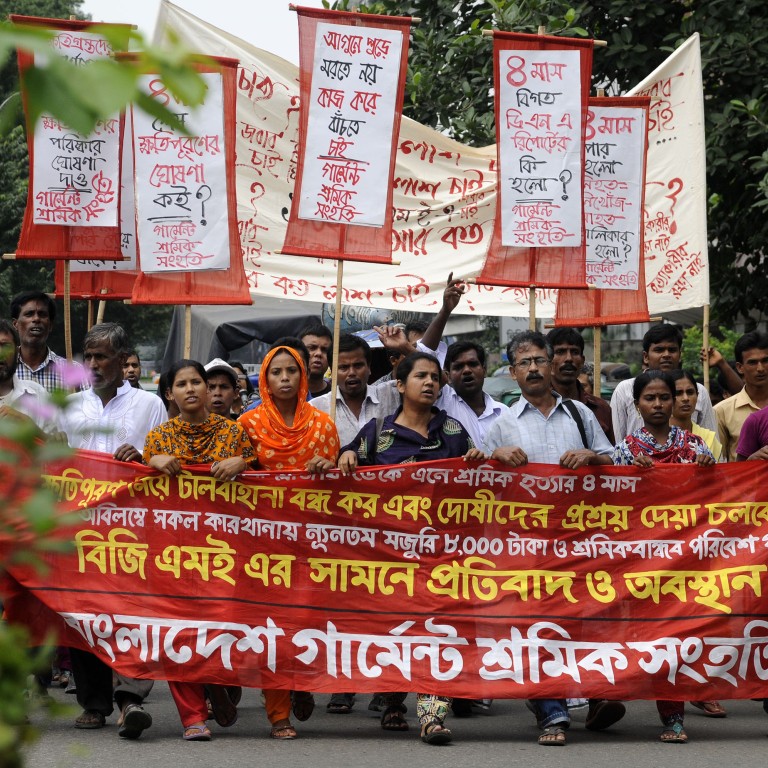
Retailers divided over Bangladesh factory victims compensation
A group of retailers and clothing brands failed on Thursday to establish compensation funds for the victims of two Bangladesh factory disasters, as many companies that sourced clothes from the buildings decided not to take part in the process.
At talks chaired by the International Labour Organisation in Geneva, the brands discussed setting up funds to compensate the victims of both the Rana Plaza disaster in April, when an eight-storey building collapsed, killing 1,129 people, and a fire at the Tazreen factory in November last year, which killed 112 workers.
The collapse of Rana Plaza, a factory built on swampy ground about 20 miles outside Bangladesh’s capital city Dhaka, ranks among the world’s worst industrial accidents and has galvanised brands to try to improve safety standards at suppliers.
But only nine out of the 28 brands being supplied from Rana Plaza came to the Geneva meeting, with some of the absentees saying they preferred to pursue their own compensation plans or citing issues with the approach adopted at the talks.
The IndustriALL trade union, which coordinated the talks, said the group that met on Thursday agreed to contribute to a fund, but would meet again in the next two weeks to establish such a fund, coordinating the process with parties including the Bangladesh government and employers.
“It is difficult to understand why some brands are using any excuse to try to avoid responsibility. The workers are waiting for money and medical assistance,” Monika Kemperle, assistant general secretary of IndustriALL, told Reuters.
The Primark discount chain owned by Associated British Foods, present at the meeting, also expressed frustration.
“The company remains concerned about the length of time it is taking to agree a framework for long-term compensation. As a result the company will now pay a second tranche of emergency aid, lasting three months,” Primark said in a statement.
It added it had created the first comprehensive database of most of those in Rana Plaza at the time of the disaster, registering details of 3,333 workers as part of its aid plan.
About 3.6 million people work in Bangladesh’s clothing industry, making it the world’s second-largest clothing exporter behind China, but some of the workforce, which is mostly female, earn as little as US$38 a month. About 60 per cent of garment exports go to Europe and 23 per cent to the United States.
The other brands at the talks that sourced from Rana Plaza were Canada’s Loblaw Cos, Bonmarche, Matalan and Store Twenty One from Britain, Mascot of Denmark, Camaieu of France, Kik of Germany and Spanish department store chain El Corte Ingles. European retailer C&A and Germany’s Karl Rieker attended talks on Tazreen compensation on Wednesday.
Several retailers were criticised for staying away from the talks, including US group Wal-Mart, which sourced garments from the factory hit by the fire, as well as Italian clothing retailer Benetton and Spanish fashion chain Mango.
Benetton’s chief executive Baigio Chiarolanza said many companies had not joined the Geneva talks due to a “lack of clarity” around objectives and a lack of involvement by several key stakeholders.
“We decided to focus our efforts and resources in working directly with those affected by the Rana Plaza disaster and their families so that we can provide them with concrete help while they need it the most,” he said in a statement.
Mango did not attend because it did not have commercial relations with factories at Rana Plaza, a spokeswoman said, though the company has said it ordered test samples from one supplier in the building.
Zara-owner Inditex, which had originally been expected to attend, said it did not join the talks as it was not supplied by either the Tazreen or Rana Plaza factories.
Asked about the talks, Wal-Mart spokesman Kevin Gardner said the world’s biggest retailer was focused on investing its resources in improving safety in factories, but did not comment directly on compensation demands from victims.
Wal-Mart is part of a North American alliance launched after Rana Plaza that seeks to improve worker safety at suppliers.
A European-led group, also brokered by IndustriALL but separate from the compensation talks, is working on the same issue, but retailers signing up to its accord accept a binding arbitration process on safety issues, enforceable in the courts of the country where a company is domiciled.
IndustriALL aims to set up long-term funds of US$74.6 million for Rana Plaza workers and US$6.4 million for Tazreen, with 45 per cent to be contributed by brands.
IndustriALL said the compensation plan it was working on was based on a scheme it developed following other factory accidents that takes into account loss of earnings, pain and suffering, as well as medical costs, funeral costs and other family expenses.
Reuters

